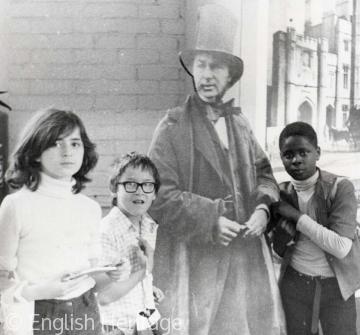Industrialists and Engineers
 A group of school children pose alongside a cardboard cut-out of I K Brunel, the great engineer forever associated with the city of Bristol
A group of school children pose alongside a cardboard cut-out of I K Brunel, the great engineer forever associated with the city of BristolThe industrial and transport revolutions of the 18th and 19th centuries saw several inventive men, often with only limited education, rise to local and national prominence. One of the first industrialists of modern Britain was probably Abraham Darby of Coalbrookdale, Shropshire, regarded as the father of the iron and steel industry or even of the Industrial revolution.
Many famous industrialists were in the cloth industry, a source of English wealth since the middle ages when John Winchcombe, 'Jack of Newbury', pioneered factory production. However it was the 18th century that saw the rise of great industrialists like Richard Arkwight, who not only invented the spinning frame but developed mills to utilise it beginning at Cromford in Derbyshire, and Samuel Crompton of Bolton whose spinning mule made England a centre of mass cloth production. Titus Salt developed his Bradford woollen mills to work with alpaca and used his resulting wealth to build his visionary mill village at Saltaire. Samuel Greg's mill at Styal, Cheshire, revolutionised the production of cotton for which Manchester was to become famous.
Many Quakers showed a flair for manufacturing especially chocolate but also shoes. John Cadbury of Birmingham, Joseph Rowntree of York and James Clark of Street, Somerset, became household names. During the 19th century many industrialists were knighted and some became peers like Jesse Boot from Nottingham, 1st lord Trent.
Engineers may have risen less high but many achieved lasting fame from the 18th century. Thomas Newcomen of Dartmouth, Devon invented a piston and cylinder engine which revolutionised pumping. In the improved form developed by steam engineer James Watt and his partner Matthew Boulton of Birmingham Newcomen's engine was found draining mines all over the world.
Robert Stephenson's Rocket, winner of the Rainhill trials was built in Newcastle-on-Tyne but the first locomotive was built by Richard Trevithick of Camborne, Cornwall. The names of Isambard Kingdom Brunel and Daniel Gooch are synonymous with the Great Western Railway but Brunel also designed the Clifton Suspension Bridge and the SS Great Britain. The motor and aircraft industries owe a lasting debt to Henry Royce of Alwalton, Huntingdonshire, Charles Royce and Frank Whittle from Coventry.
And how would the 21st century cope without the computer? James Babbage's difference engine was ahead of its time but sowed a tiny seed which with the help of Alan Turing from Paddington became the modern computer.



